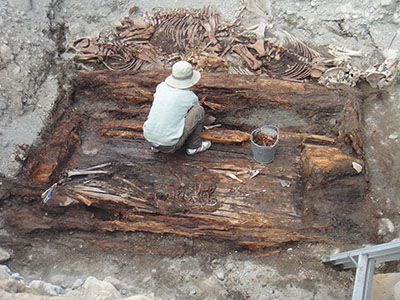Using AI to control energy for indoor agriculture
30 September 2024
Published online 28 April 2017
Modern-day domesticated horses lost their genetic diversity within the past 2,300 years.

A team of researchers analysed the genomes of a mare belonging to the Russian Sintashta culture some 4,100 years ago, and 15 stallions sacrificed as part of two separate funerary rituals of elite Scythians in Tuva, Russia, and Berel, Kazakhstan, respectively 2,700 and 2,300 years ago.
“We found that Scythians kept a diversity of horse types in terms of their coat colouration, their genetic diversity, and their speed/endurance capacity,” says molecular archaeologist Ludovic Orlando of Denmark’s Centre for GeoGenetics, who led the study.
The horses were not inbred, he says, indicating that the Scythians interacted with horses while maintaining their natural herd structure.
“They were using a much larger diversity of stallions,” he says. “Since then, we have changed our breeding practices by integrating fewer and fewer male lineages.”
This has led to a “demographic collapse” of domestic horses over the past 2,300 years, says Orlando, increasing the number of harmful mutations in present-day domestic horses.
The findings support a hypothesis that stipulates that traits commonly found in domestic animals are related to developmental changes affecting the tissues and cells derived from the ‘neural crest’: a transient embryonic structure that gives rise to the peripheral nervous system and several other cell types such as skin pigment cells, the smooth muscle of the heart, connective tissue, and cartilage.
The study, co-authored by two scientists from Saudi Arabia, is part of a five-year project that aims to investigate human history through its interaction with and breeding of horses.
“Horses probably represent the most important domestic animal in human history as they greatly influenced warfare, transportation and agriculture,” says Orlando. Studying the history of horse domestication provides a way to study how various aspects of human culture were developed and changed over time.
doi:10.1038/nmiddleeast.2017.77
Stay connected: